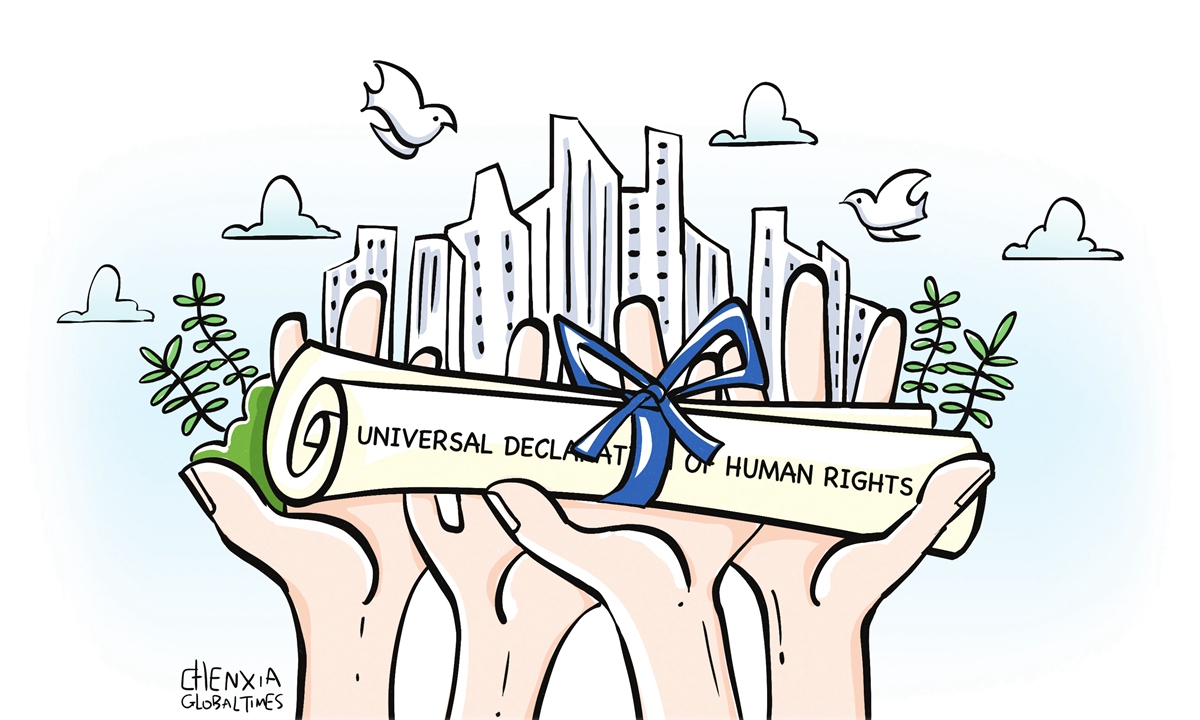
Illustration: Chen Xia/Global Times
Editor's Note:
The issue of human rights has always been a crucial topic for the whole world, especially given the current upheaval in certain regions. This year marks the 75th anniversary of the Universal Declaration of Human Rights (UDHR). Why is the UDHR considered a milestone for human civilization? What are the differences between the West and China in terms of human rights? What contributions has China made to the development of human rights? Experts at a seminar held by China Society for Human Rights Studies in Beijing on Monday discussed these issues. The Global Times selected the opinions of three experts.
Lu Guangjin, secretary-general of the China Society for Human Rights Studies and professor of the Law School at Jilin University
The birth of the UDHR is certainly a landmark event in the history of human civilization. No other human rights document has had such a broad and profound impact on the development of human society as the UDHR. Although 75 years have passed since the creation of the document, the importance and influence of the UDHR still exist today. It continues to inspire the world to work hard to respect and protect human rights.
When the United Nations General Assembly voted on the Declaration, out of the 58 countries that participated in the vote, 48 countries voted in favor, 8 abstained, and 0 voted against. This result exceeded the expectations of everyone involved in the drafting of the Declaration.
Although historic achievements have been made in the development of human rights worldwide over the past 75 years, the goal of ensuring that everyone enjoys human rights and fundamental freedom is far from being achieved. Today, there are still many conflicts and problems hindering the development of human rights in the world.
First, there are numerous challenges to effectively safeguard basic human rights and promote human well-being, such as the large number of refugees due to regional conflicts, the aggravation of poverty as a result of the widening development gap and the COVID-19 pandemic, and the unsustainable development caused by climate change and environmental degradation. Second, some Western countries are still pursuing hegemony in human rights, and politicizing, instrumentalizing, and weaponizing human rights. They treat human rights with an attitude of confrontation rather than unity and cooperation.
At this critical historical moment of profound changes not seen in a century, China upholds the spirit of inclusiveness for different civilizations. President Xi Jinping has proposed the major concept of building a global community of shared future, advocating the common values of peace, development, fairness, justice, democracy and freedom for all humanity. He has also put forward the Global Development Initiative (GDI), Global Security Initiative (GSI), and Global Civilization Initiative (GCI), advocating safeguarding human rights through security, promoting human rights through development, and advancing human rights through cooperation. China's ideas, initiatives and propositions have played an important leading role in promoting global human rights governance and the development of the world's human rights cause.
Qi Yanping, director of the center for science and technology and human rights studies at Beijing Institute of Technology
The purposes and objectives for which the United Nations was founded were to save succeeding generations from the scourge of war, while adhering to the principles of sovereign equality, respect for the political independence and territorial integrity of all states, restraint from the threat or use of force, non-interference in the internal affairs of other states and the settlement of disputes by peaceful means.
The post-WWII is a world based on international law. The post-WWII world of human rights is also a world based on sovereign states. In the 75 years since the UDHR was issued, Western countries have employed the issue of human rights to intervene in the internal affairs of other countries under the banner of "human rights above sovereignty," resulting in frequent wars, prolonged social unrest and the displacement of people in some countries.
War is the natural enemy of human rights, and conflict is the greatest threat to human rights. The new round of the Israel-Palestine conflict has resulted in massive civilian casualties, leading to a serious humanitarian disaster. From the outset, China has consistently advocated the promotion of a ceasefire, the effective protection of civilians, the provision of humanitarian assistance, the intensification of diplomatic mediation, and a political approach through the two-state solution. China has also insisted on a comprehensive, just and lasting solution to the question of Palestine.
Over the past 75 years, no matter how the world has changed, China has always stood firm on justice and the conscience of humankind. It has stood on the side of peace, practiced genuine multilateralism, and safeguarded the sovereign dignity, fundamental rights and core interests of small and vulnerable countries. This fully reflects China's faithful respect for the purposes of the Charter of the United Nations and the UDHR.
China's modern human rights practices have effectively implemented the principles and spirit of the UDHR. The UDHR emphasizes the significance of freedom, justice, peace and the rule of law. These basic principles have the dimensions of both formality and practicality. While the practices of human rights in the West focus on formality, China has long focused on practicality.
The Western concept of individualism and liberalism inherently lack the attention on "relationship," "otherness" and "responsibility." The traditional Chinese culture has been based on relations, and it advocates the responsibility to the group and to others. In the West, the human rights has been used as tools by individuals to confront the state, while the modern human rights system of China focuses more on social order. This innovation and development addresses the inherent historical limitations of the traditional individual human rights, and provides China's wisdom for the world's human rights development.
Fu Zitang, former president of Southwest University of Political Science and Law
Today, our world and our times are changing in ways like never before. The GDI, the GSI, and the GCI proposed by President Xi Jinping together constitute the three global initiatives. From the perspective of human rights protection, the three global initiatives are an effective solution to the problem of human rights deficit and the improvement of global human rights governance.
The logical relationship between the core elements of the three global initiatives is that: Security is the prerequisite for development and civilization, as without a peaceful and tranquil environment, development and civilization would be impossible; development is the foundation of security and civilization, as only through prosperity and development can peace be sustainable and civilization make progress; civilization is the result of security and development, and in turn, it can provide spiritual support for security and development.
The three initiatives complement each other and are inseparable. They together constitute a driving force for improving global human rights governance and promoting the development of the global human rights. First, common development is the "master key" to promoting the protection of human rights. Second, shared security is the "stabilizer" for the consolidation of human rights. Third, discussing civilization can help eliminate confrontations regarding human rights.
As the initiator and implementer of the three global initiatives, China not only focuses on the happy life of the Chinese people but also devotes itself to the common well-being of humanity, providing important practical experience and guidance for promoting global human rights governance and building a global community of shared future through positive actions. China promotes human rights through development, which tackles global development difficulties; safeguards human rights through security, which ensures world peace and security; promotes human rights through cooperation, which builds a new form of human civilization.

